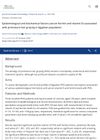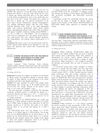 30 citations,
September 2016 in “BMJ”
30 citations,
September 2016 in “BMJ” Taking 5-α reductase inhibitors for prostate enlargement or hair loss does not significantly raise the risk of erectile dysfunction.
 18 citations,
July 2019 in “Clinical Endocrinology”
18 citations,
July 2019 in “Clinical Endocrinology” Women with PCOS in Sicily show different levels of metabolic problems depending on their PCOS type, with obesity and abnormal lipid profiles being common.
 16 citations,
May 2013 in “Urology”
16 citations,
May 2013 in “Urology” Metabolic syndrome linked to urinary symptoms; hair loss not significant.
 15 citations,
March 1998 in “Journal of Public Policy & Marketing”
15 citations,
March 1998 in “Journal of Public Policy & Marketing” The paper concludes that drug labels should be clear for all, especially for those with low literacy, and suggests aiming for high comprehension test passing rates with diverse test populations.
 11 citations,
April 2017 in “Journal of The European Academy of Dermatology and Venereology”
11 citations,
April 2017 in “Journal of The European Academy of Dermatology and Venereology” Found different long non-coding RNAs in balding Chinese men, which may help create new treatments.
11 citations,
December 2013 in “International Journal of Dermatology” IL16 gene variations may affect the risk of alopecia areata in Koreans.
10 citations,
February 2022 in “Epidemiologia” One-third of COVID-19 patients had long-term symptoms like hair loss and fatigue, with women, older individuals, blood group B, smokers, and those with more virus exposure at higher risk.
 10 citations,
December 2010 in “British Journal of Dermatology”
10 citations,
December 2010 in “British Journal of Dermatology” After menopause, some women lose scalp hair and gain facial hair, with patterns suggesting different underlying causes.
 9 citations,
January 2018 in “Annals of Dermatology”
9 citations,
January 2018 in “Annals of Dermatology” People with more knowledge about their hair loss condition and those who see it as a serious issue are more likely to seek treatment.
8 citations,
January 2015 in “Genetics and Molecular Research” Certain gene variations increase the risk of alopecia areata in Koreans.
 7 citations,
January 2015 in “Dermatology”
7 citations,
January 2015 in “Dermatology” Two gene variations, rs6493497 and rs7176005, may be linked to female hair loss in Chinese people.
7 citations,
May 2008 in “PubMed”  6 citations,
November 2019 in “The application of clinical genetics”
6 citations,
November 2019 in “The application of clinical genetics” The study found that a specific genetic variation in the TNFα gene is significantly linked to Alopecia Areata in the Jordanian Arab population.
 4 citations,
April 2020 in “Journal of Cosmetic Dermatology”
4 citations,
April 2020 in “Journal of Cosmetic Dermatology” Low vitamin D levels are linked to different types of hair loss.
 3 citations,
January 2022 in “Journal of Infection”
3 citations,
January 2022 in “Journal of Infection” Some early COVID-19 mutations in patients predicted future common virus mutations.
2 citations,
May 2020 in “Journal of the American Academy of Dermatology” Using certain hair products may increase breast cancer risk in black women.
 2 citations,
January 2019 in “Annals of Dermatology”
2 citations,
January 2019 in “Annals of Dermatology” Certain gene variations in EGF and EGFR may increase the risk of alopecia areata in Koreans.
 2 citations,
April 2017 in “European Urology”
2 citations,
April 2017 in “European Urology” Using finasteride for hair loss or prostate issues does not significantly raise the risk of erectile dysfunction.
1 citations,
October 2022 in “Journal of Cosmetic Dermatology” Combining microneedling with 2% minoxidil is more effective and safe for treating female pattern hair loss than using minoxidil alone.
1 citations,
August 2021 in “Medical Science Monitor” Male and female hair loss have different genetic causes.
1 citations,
August 2021 in “International Journal of General Medicine” Severe and early hair loss may indicate a higher risk of heart disease.
 1 citations,
October 2020 in “Journal of Cosmetic Dermatology”
1 citations,
October 2020 in “Journal of Cosmetic Dermatology” Low iron levels are linked to premature graying of hair, but vitamin D levels are not.
 December 2024 in “Journal of Cutaneous and Aesthetic Surgery”
December 2024 in “Journal of Cutaneous and Aesthetic Surgery” Dermoscopy effectively assesses and improves acne scar treatments.
 November 2024 in “Australasian Journal of Dermatology”
November 2024 in “Australasian Journal of Dermatology” The study's methods are flawed, making its conclusions about finasteride and mental health unreliable.
 September 2023 in “Journal of the American Academy of Dermatology”
September 2023 in “Journal of the American Academy of Dermatology” Oral terbinafine is more effective than griseofulvin for treating certain scalp infections in children.

Higher disease activity in systemic lupus erythematosus is strongly linked to more internal organ damage.
 April 2023 in “American Journal of Transplantation”
April 2023 in “American Journal of Transplantation” Hormone replacement therapy may lower the risk of severe COVID-19 outcomes in non-immunosuppressed people and male organ transplant recipients.
 November 2022 in “Journal of Investigative Dermatology”
November 2022 in “Journal of Investigative Dermatology” Short-term treatment with ROCKi increases skin cell growth without changing stem cell features.
 August 2022 in “medRxiv (Cold Spring Harbor Laboratory)”
August 2022 in “medRxiv (Cold Spring Harbor Laboratory)” Certain groups of medications given when leaving the hospital are linked to a higher risk of negative drug reactions within 30 days, especially in older adults with respiratory issues.
 March 2021 in “Research Square (Research Square)”
March 2021 in “Research Square (Research Square)” Stress likely causes hair loss in Formosan macaques.





















